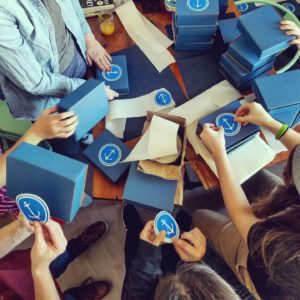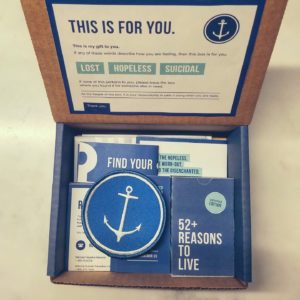Trigger Warning: Today’s story contains descriptions and information about depression and suicidal ideation, which may be triggering to survivors or to the family and/or friends of victims. If you or someone you know is struggling with suicidal thoughts, please seek help. You can call the National Suicide Prevention Lifeline 24-hours a day at 1-800-273-8255 for assistance.
Walking out of class one day, I saw an interesting sight: 1,100 backpacks strewn across the lawn of my school. What did they mean? Why were they there? Those 1,100 backpacks represent the 1,100 college students who die by suicide each year. Mental health is just as important as physical health, but we don’t talk about it that way.
The issue of depression and suicide isn’t limited to college students though. According to the American Foundation for Suicide Prevention, over 40,000 people die by suicide each year.
So what kind of resources are available for those struggling with their mental health? This is where Find Your Anchor Foundation comes in. Simply put, the goal of the Find Your Anchor project is suicide prevention, awareness, and education. The premise behind Find Your Anchor is that each person needs an anchor.
As founder Ali Borowsky puts it, “Establish an anchor – a dependable, stable, secure base that you can hold on to, one that keeps you firmly planted, no matter what winds or storms may come. Anchors are everywhere, you just have to start looking.”

Find Your Anchor doesn’t assume that it’s the anchor or that it has all the answers, but instead, it sets out to create a community of anchors, all with the help of tiny blue boxes.
“For those contemplating suicide, there is an overwhelming sense of loneliness and abandonment, despair, hopelessness,” Ali said. “I wanted something specifically for them, a box full of ideas, support, and inspiration. A box full of anchors. Designed with them in mind, I wanted those in need to open the box and think ‘Someone cared enough to make this for me.’ I wanted to provide, or spark within them a reason to fight. Find Your Anchor is that reason to fight.”
Find Your Anchor plants these tiny blue boxes in public places where people who may be close to suicide can organically find them. Additionally, these boxes can be requested from their website here.
Ali wanted to make suicide awareness into boxes because everything she had ever encountered regarding the issue was so “sterile” and “hospital-brochure-y.”
“I really wanted something that spoke to the person holding the box,” she said. “This project, each box, in a lot of ways is a physical representation of me being fortunate enough to be in a better spot – the physical representation of being ‘anchored’ and wanting to pay that forward.”

To get a better feel for these boxes, I requested one from Find Your Anchor. What I received was a discreet cardboard box with a simple anchor logo on it. The standard initial package from the contains a pack of cards “52+ Reasons to Live,” an anchor patch and sticker, information on help hotlines, and IM websites available 24/7, letters of encouragement, and other items for emotional support.
But most importantly, a note at the bottom of the box encourages users to add a little piece of themselves to the box after they are ready – a little something that helped get them to a better place.
These items, Ali said, serve as “a reminder that you’re not alone, that there is hope.”
Then, the boxes are meant to be placed in public places in order to be passed on to others in the community and help the next person in need. Find Your Anchor really stands out in its extremely personal connections it creates and its strong network of individuals who know that depression doesn’t have to be fought alone.
“FYA seeks to build communities around suicide awareness, education, and prevention,” Ali said. “In the past, we’ve conducted workshops with various schools, youth organizations, and mental health facilities. More recently, we’ve started to partner with schools to provide Find Your Anchor boxes to students in need.”
Ultimately, Ali said, she would like to expand the mission to more people and see FYA boxes on every college campus.
Remember, anchors come in all sizes and shapes. Let’s all make an effort to be an anchor for someone. Don’t forget about the kid in the back row or the quiet one on your sports team. Even a small act, when multiplied by millions of people, can transform the world.
To find your own anchor today, visit https://findyouranchor.us/.




















